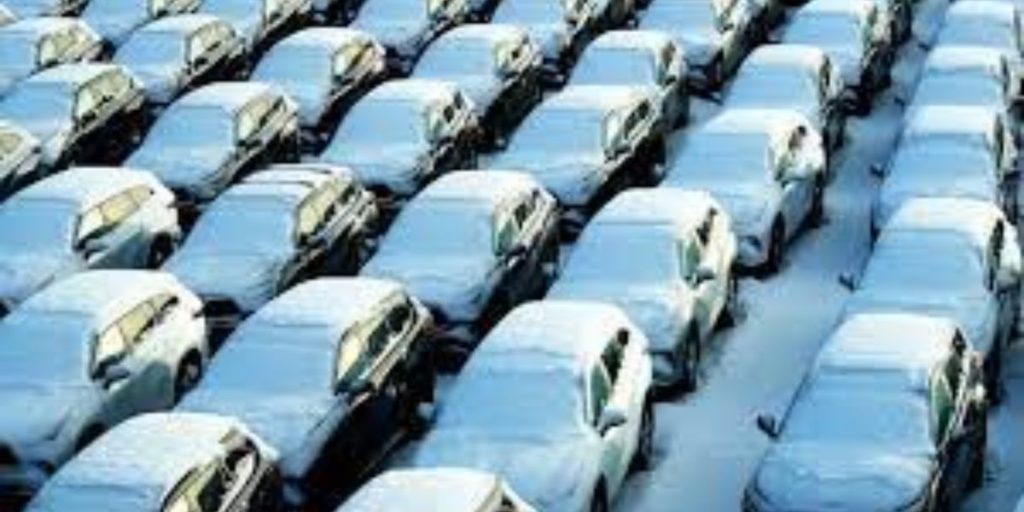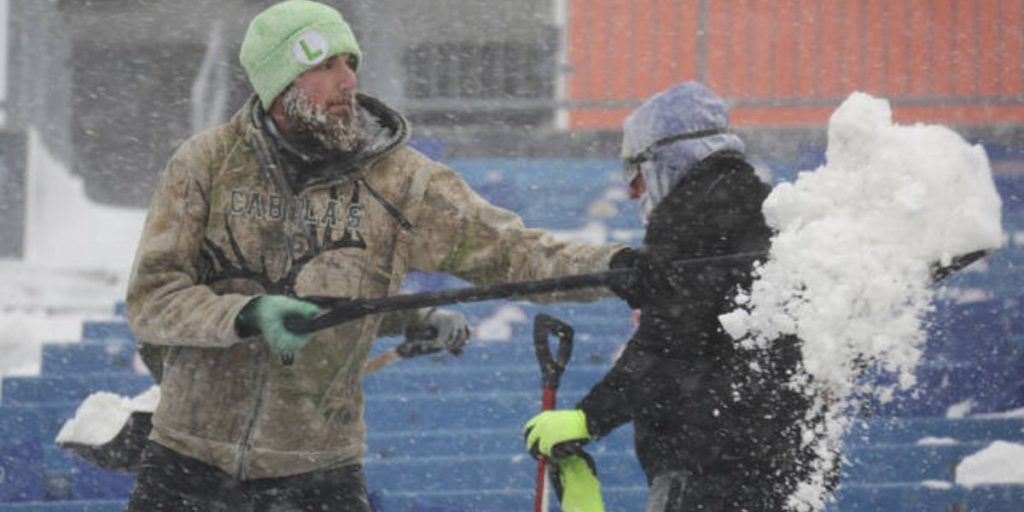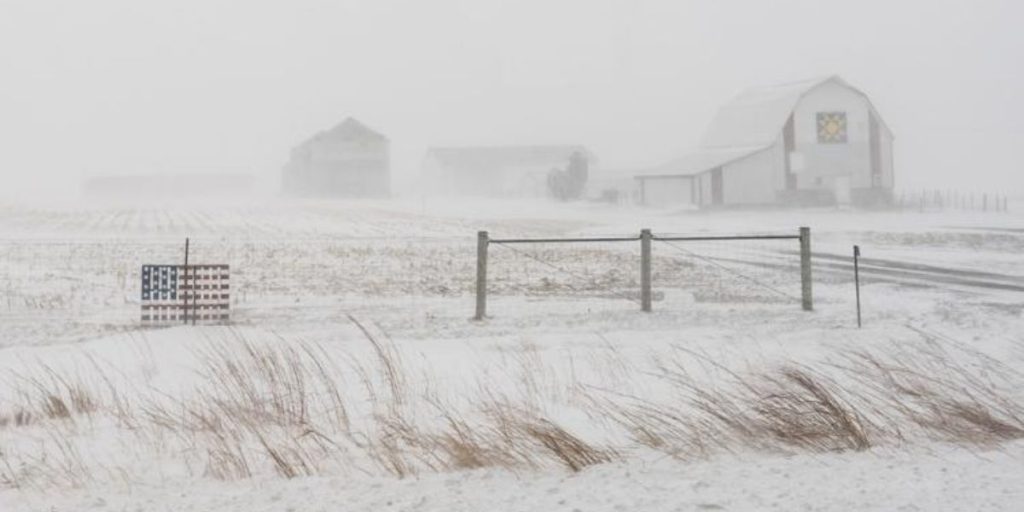Subfreezing temperatures across much of the United States exposed millions of Americans to dangerous cold as Arctic storms killed four people and knocked out power to tens of thousands in the Northwest, brought snow to the South, and walloped the Northeast with blizzard conditions that forced an NFL game to be rescheduled.
Wind chills below zero Fahrenheit (minus 17 Celsius) prompted weather warnings or advisories for an estimated 95 million people across the country on Sunday. Forecasters predicted that the harsh cold will spread as far south as northern Texas, with wind chill values as low as minus 70 degrees (minus 56 Celsius) in Montana and the Dakotas.
“Frostbite can set in minutes,” the South Dakota Department of Public Safety stated in a statement Sunday warning residents to stay indoors.

Snowfall of 1 to 2 feet (30 to 60 centimeters) was anticipated in Buffalo, New York, prompting officials to postpone the Buffalo Bills-Pittsburgh Steelers NFL playoff game from Sunday until Monday. Winds gusted to 30 miles per hour (48 kilometers per hour), and snow fell at a rate of 2 inches (5 centimeters) per hour.
Workers with shovels and trucks worked to clear snow from Buffalo’s Highmark Stadium’s field, as the Bills cautioned volunteers eager to assist with the shoveling to stay at home and not defy a travel ban on nearby roadways.
“Looks like a pretty good day to not have a football game,” New York Gov. Kathy Hochul, a Buffalo native, posted on X, along with a video clip of whiteout conditions in the city.
At least one Bills player was out in the rain on Sunday, making the most of his newfound free time. On Instagram, offensive tackle Ryan Van Demark posted a video of fellow lineman Alec Anderson assisting a vehicle that was stuck due to slippery road conditions.
“Good Samaritan, Alec, helping the people,” Van Demark says in the short video.
According to Zack Taylor, a National Weather Service meteorologist in College Park, Maryland, certain portions of the Northeast may experience heavy snowfall and high winds, with gusts of up to 50 mph (89 kph) likely.
“That’s why they’re expecting to see near-blizzard conditions at times,” Taylor went on to say.
A day after heavy winds and a mix of snow and ice brought down trees and power lines in Oregon, more than 120,000 households and businesses were without power, most of which were in the Portland metro region.

“Given the extent of the damage and the high level of outage events, restoration efforts will continue into the week, and customers are encouraged to plan accordingly,” stated Portland General Electric in a statement. The company said it was keeping an eye on a second weather pattern that was forecast to bring heavy winds and freezing rain on Tuesday.
The Portland Bureau of Environmental Services stated that its staff were working around the clock at various locations to perform emergency repairs and avoid sewage discharges into homes and businesses. Due to a frozen pipe, Portland’s largest sewage pump plant, which feeds downtown and the surrounding inner city, was only partially operational.
Power disruptions affecting tens of thousands were also reported in Michigan, New York, Pennsylvania, and Wisconsin on Sunday. In Nebraska, the Omaha Public Power District encouraged consumers to save energy in order to avoid power outages.
“The weather came on faster and has been more prolonged than anticipated,” the district stated in a statement Sunday.
Airports all throughout the country were affected. More than half of Buffalo Niagara International Airport’s flights were canceled. Hundreds of flights were also canceled or delayed at airports in Chicago, Denver, and Seattle-Tacoma.
Forecasters also cautioned that sudden bursts of heavy snow and wind could create severe declines in visibility in eastern Pennsylvania, areas of northern New Jersey, and Delaware, with “near whiteout conditions” probable.
Another Arctic storm that dumped heavy snow in the Rockies was expected to move south, delivering 4 to 6 inches (10 to 15 centimeters) of snow to Arkansas, northern Mississippi, and west Tennessee.
Juan Villegas donned layers of clothing beneath his heavy coat Sunday as he and about a dozen subcontractors shoveled away a blanket of snow in downtown Des Moines, Iowa, that also covered park benches and partially buried fire hydrants the day before the state’s presidential caucuses.
Working at minus 15 degrees (minus 26 degrees Celsius) cold, Villegas said the easiest way to stay warm was to “just keep moving.”
“If you stay doing nothing, it’s when you really feel the cold,” Villegas went on to say.
Wind chills as low as 30 degrees below zero (minus 34 Celsius) were anticipated for much of Wisconsin until Monday afternoon.

Snow could fall in regions of northern Louisiana, Alabama, and Georgia. Mary Trammel of Shreveport, Louisiana, was among many who stocked up on bottled water, food, and generator fuel ahead of subfreezing weather that was forecast to coat some roadways in ice and up to an inch (2.5 centimeters) of snow.
“It’s cold out here,” Tramel added, adding that she bought bread and soup ingredients to last several days.
Arkansas Gov. Sarah Huckabee Sanders issued a state of emergency ahead of time to give utility trucks and trucks transporting crucial supplies more leeway in responding.
Cold spells in 2021 and 2022 led pipelines to rupture and water pressure to plummet across Mississippi’s capital city of Jackson, prompting officials to prepare for days of frigid weather.
“We feel as confident as we can that we’re prepared for whatever comes our way,” Ted Henifin, interim manager of Jackson’s long-struggling water system, told WAPT-TV. He stated that crews were ready to respond to any broken pipes.
The severe weather brought more than just snow and ice. Record high tides that swamped some homes in Maine and New Hampshire on Saturday also washed three ancient fishing shacks into the sea in South Portland, Maine, where they had stood for more than 130 years.
“History is just being washed away,” Michelle Erskine said on Sunday, a day after seeing the last two wooden shacks sinking into the sea.
100 trees fell in Oregon, just south of Portland, on Saturday, including one that fell on a house and killed a man. Two more persons died of suspected hypothermia, and a fourth died in a fire started by an open-flame stove after a tree fell on an RV.
The snow and high winds had stopped in Oregon on Sunday, but the cold temperatures meant that roads remained hazardous, and much of Portland was closed. Glenn Prohaska was seeking a company with WiFi in nearby Lake Oswego so he could book a hotel. The temperature in his house had plummeted to the 20s overnight due to the power outage.
“In the 40 years I’ve been here, this is the worst I’ve seen,” he added.